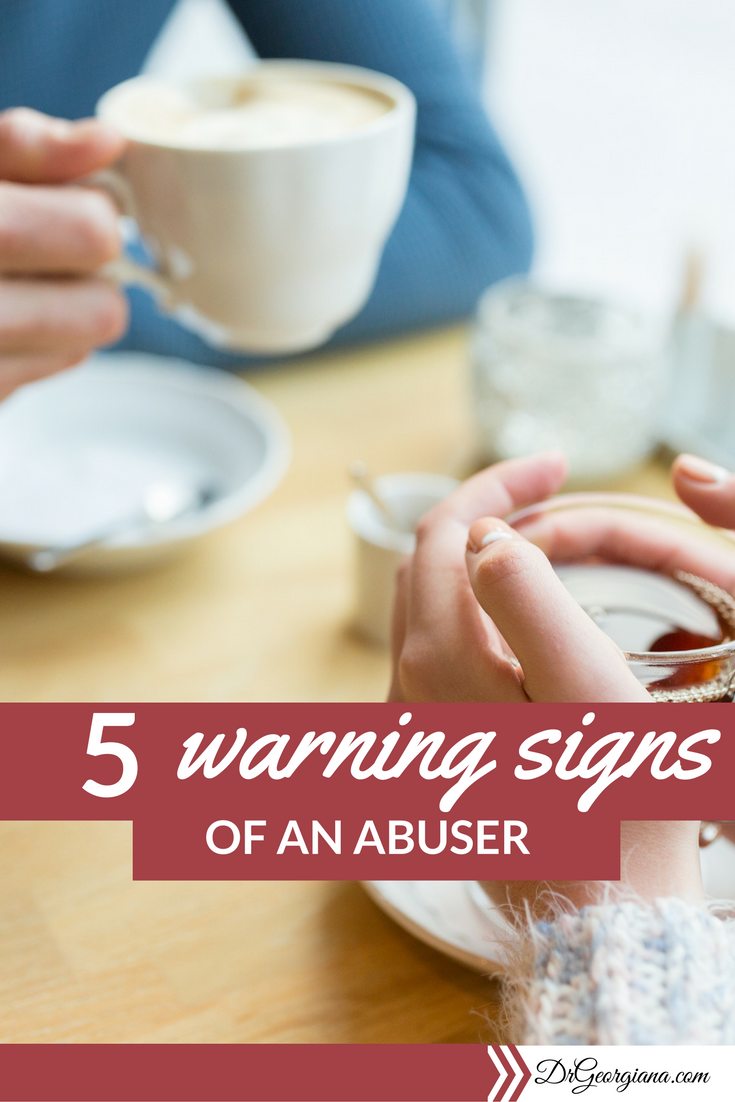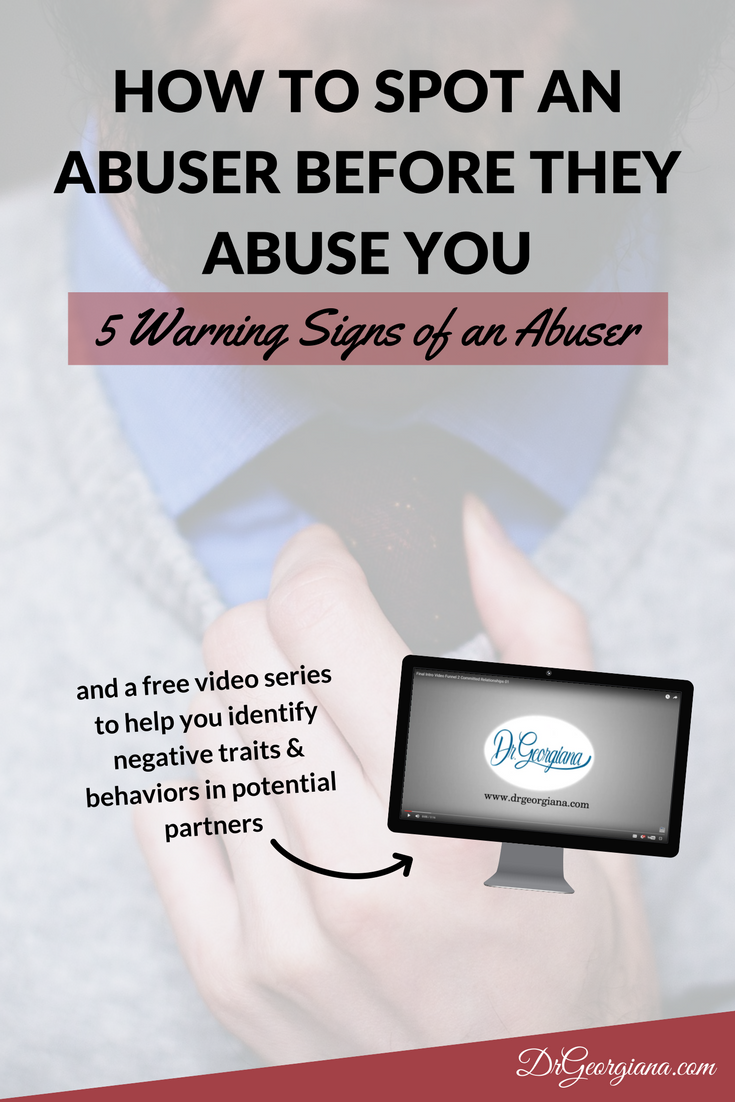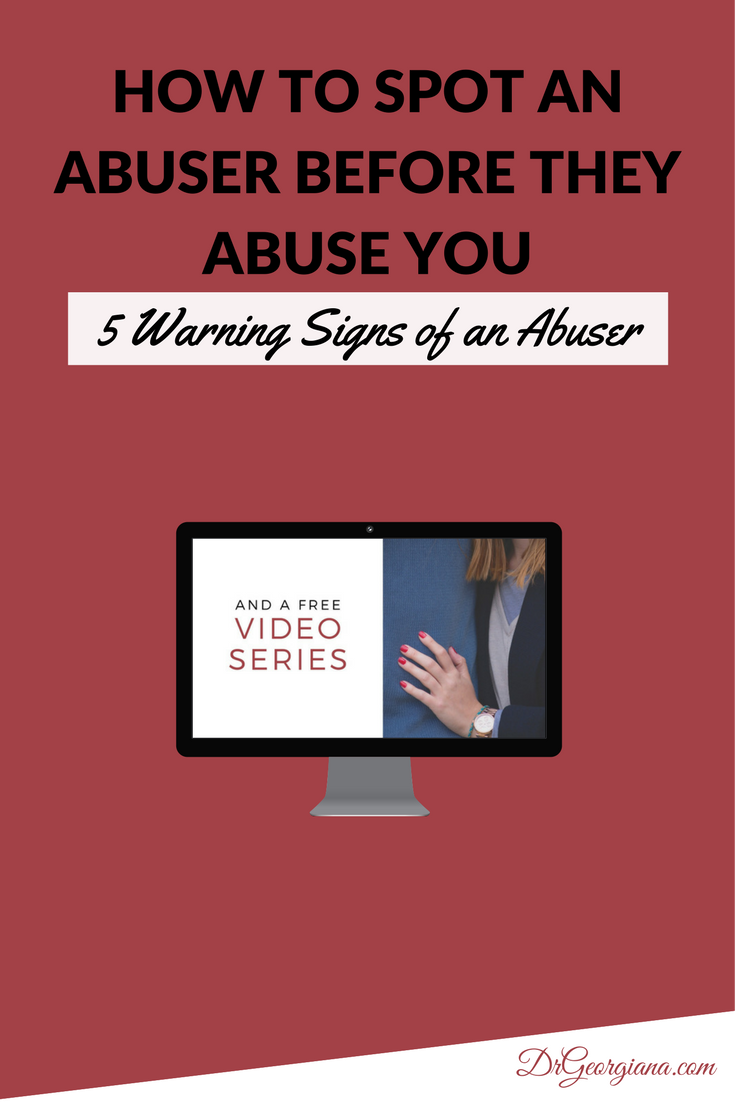
Welcome to the “Ask Dr. Georgiana” Relationship Series. This week we will be discussing how to spot an abuser before they abuse you.
Have you ever had an abusive partner? And by abusive, I mean someone who has used degrading and demeaning language, withheld affection or financial help in order to punish you, hit you, shoved you, punched you, kicked you, or consistently yelled at you? And after being involved with that abuser, did you ask yourself if there were signs you missed that would have helped you detect their abusive tendencies earlier on?
Well, you are not alone. Many people have had this experience. I am addressing this subject in response to an email I received from Albert, from Los Angeles, California stating the following:
“Dr. Georgiana. I am in desperate need of help. A year ago, I got involved with what I thought was the sweetest woman I had ever met. She accompanied me everywhere, helped me clean my house, and was very attentive to my schedule. I had never met someone so dedicated to me before and so I fell deeply in love and married her only 6 months after meeting her. Since then, her behavior has turned into a nightmare. She has become a witch… puts me down, laughs when I make mistakes, throws food on the ground when I buy a meal she does not like and has even broken my phone. What did I miss? Please tell me because I never saw it coming…”
Albert’s traumatic experience is not that unusual and speaks to the need for learning to evaluate others before getting intimately involved with them. This is why the primary goal in my Coaching practice is to teach my clients how to spot unhealthy traits and behaviors in anyone they come in contact with. Contrary to most of what you will find on the internet which focuses on positive traits in people and on what to do to get your dates to like you, I focus on avoiding what you do not want in others and on recognizing what will make you deeply unhappy.
Let’s discuss the five specific negative traits and behaviors to be aware of in order to anticipate whether someone is an abuser. You should look for negative traits and behaviors in a person in at least four different types of relationships in their lives: their relationship with their family of origin, with their friends and colleagues, with strangers, and with you. Traits and behaviors that are ingrained and extreme tend to manifest in most, or all, relationships. Even if someone does not show abusive behavior towards you specifically at the beginning, the best chance you have to find out if the person is abusive is by observing their other relationships. During courtship, take out your investigator hat and take note of what you see and hear that you do not like.
Focus on the following five negative traits that are distinctive of an abuser:
Need for Control
The need to control others may not make a lot of sense to you. If you are a live-and-let-live person, you would never want to control someone else. Even if you’re a perfectionist, you may stay on your own case all day, and not someone else’s. But extreme controllers cannot mind their own business. They micromanage what others say, how they act, even what they think. Early on in a relationship, they may be overly attentive and dedicated to you. But eventually, they will expect you to depend on them and will want to be involved in everything you do. They will force you to go to the movie theater or restaurant of their choice or to wear what they like. They may also attempt to keep you from seeing or talking to loved ones or friends. At first, you may feel loved and adored because they want to spend all their free time with you but beware, it may not be so much that they want to spend time with you, but rather that they don’t want you spending time with anyone else. Watch this type of excessive behavior in your dates, as it manifests in their relationship with you and others and ask yourself if at times it seems excessive. If it feels excessive, trust your instincts. It is likely to stay that way no matter how much you complain about it. Also make sure you are aware of their moodiness, as it is a key trait in a controlling person. Moody people tend to mull over perceived hurts and injustices that have happened to them. They will be unpredictable and being around them may make you feel tense and tired. These traits are usually very apparent but because your date may at first complain mostly about other people and have you on a pedestal, you may miss them. Remember that the behavior that your date exhibits with others will likely repeat with you at one point or another.
Low Frustration Tolerance
People who are abusive have a hard time managing stress and frustration. In the face of stressful situations, they get demanding, unyielding, controlling and very angry. These characteristics make them more likely to lash out. If your date is unable to manage moderately difficult situations without being highly frustrated and without demanding that other people make these situations disappear for them, it is a very bad sign. For example, notice how your date manages stressful situations at work and whether they become obsessive and unnecessarily frustrated with tasks and unresolved issues with other people.
Impulse Control and Use of Substances
Abusers are impulsive and often overuse substances. As you probably know, substances reduce a person’s capacity to manage emotions and to postpone gratification. If your date abuses substances, they will be more likely to make rash decisions and when upset they are more likely to lash out. Even if they don’t lash out at you at first, but do react angrily with people, animals or objects, this is pretty telling and should be unacceptable. You should expect that your partner would be able to manage alcohol and not have addictions. If they do, the chances that they will become abusive with you during disagreements in the future are much higher. Another way in which you can detect a potential abuser is to pay attention to how they manage sexuality. Abusers often engage in odd sexual behavior and their impulsivity is evident during intimacy. Be mindful of how you feel when you are being sexual with them. If they do not respect your boundaries, it is a red flag, especially if you feel criticized when you don’t agree with the way in which they manage intimacy or if they criticize past partners for their sexuality. Keep in mind that an abuser will tend to get a thrill out of pushing their sexual agenda regardless of how uncomfortable it causes you to feel.
Difficulty in Managing Emotions
Jealousy is very common in relationships but it has to be reasonable. If you can’t look at people on the street or talk to an old friend at a restaurant without generating suspicions of cheating, this is a sign of trouble. It is common to find jealousy in a date flattering, but it will not be so flattering if it gets to the point where you will be walking on eggshells and become alienated from friends, family, and work associates. If you are being accused of something that you did not do and there is no evidence that you were even intending to do it, you may have a future problem on your hands. Set the limit early on and see if that limit is respected. Don’t be flattered by the attention. Jealousy is not always representative of someone’s level of care. Some people are jealous because they are territorial and insecure. Abusers will go to great lengths to protect what they consider their own property. If your date has a jealousy problem, you may detect it by asking questions about their past relationships. If their previous partner left them for something they did, you may want to inquire further.
Low Self-Esteem or Narcissism
People with low self-esteem and people with narcissistic traits may seem opposite at first. After all, the typical person with low self-esteem tends to present as timid, unsure and often self-critical. On the other hand, people with narcissistic tendencies often present as boasting, unyielding, demanding and self-centered. And yet, these two types of individuals have similar characteristics, in that they are hiding a huge need for attention and validation. At the extreme, both can become abusive. So in general terms, when evaluating your date, look for any extreme trait or behavior that suggests a difficulty in managing a sense of self-worth, in respecting other people’s needs, or in taking responsibility for what happens to them. If they are unfair with others, do not excuse them just because they cater to you. It may not last.
Before we end this segment, I want to acknowledge the people who are currently in an abusive relationship or have been in the past. Abuse leaves an indelible mark on your soul and can make you feel broken. If you have had a previous relationship with an abuser, please don’t blame yourself. Although there could be reasons why you missed the evidence that may have been right in front of you, you also did not have a proper system for evaluating others that could protect you from harm. Developing the ability to detect an abuser is a process. You have to know what you are looking to avoid, be willing to observe, listen, and keep track of facts, and be able to resist being swayed by feelings and attraction until you are certain that you can be safe with them, and that takes some time.
I hope that shedding some light on these five traits will help decrease some of your anxiety about dating potentially abusive individuals. If you want to know more about spotting unhealthy traits and behaviors in others, read my eBook “Don’t Get Stuck with The Wrong Partner: Learn to Detect Unhealthy Traits and Behaviors in Others”.
I want to thank Larry for reaching out with his concern. If there is anything else I can do, please don’t hesitate to contact me. I am honored to be part of your journey to find and enjoy the right partner and look forward to sharing future articles with you, connecting in one of my online relationship programs, or having a personalized Relationship Coaching session.
If you have tips regarding abusive traits and behaviors in a date or partner or detecting an abuser, please share your wisdom in the comments’ section below or on my Facebook page. There are a lot of people in similar situations than yours who can benefit from your experiences. You can see the answer to many of my subscriber’s questions and be notified when I post new articles by signing up to receive my online news bulletin at www.drgeorgiana.com.
ABOUT THE AUTHOR
Author Georgiana Spradling, Ph.D., MFT, CDVC, is a multicultural and multilingual (English, Spanish, & French) Emotional Intelligence Relationship Coach with over 20 years of experience helping people choose the right partners and avoid the wrong ones, manage emotions and behaviors in self and others, leave unhealthy partnerships, and move past old relationships. She is a Certified Domestic Violence Counselor and has a Certificate as an Anger Management Facilitator. Her e-book: “Don’t Get Stuck with the Wrong Partner: Learn to Detect Unhealthy Traits and Behaviors in Others” is available on the Amazon Kindle. You can subscribe to her videos on the undesirable sides of dating, committed relationships, separation and divorce on her YouTube Page.
Dr. Georgiana coaches on the telephone, online or in her office in San Francisco (USA) and offers a FREE 25-minute Consultation. She can be reached through her website: www.drgeorgiana.com, by e-mail: gs@drgeorgiana.com or phone: 1-650-731-5105.


